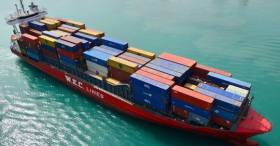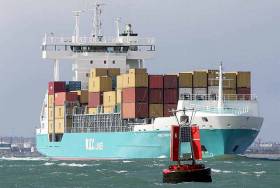Displaying items by tag: WEC Lines
WEC Lines to Further Expand Port of Liverpool Services
Shipping company WEC Lines has expanded its existing service into the Port of Liverpool with a new series of weekly calls to the UK port from northern Spain, Portugal, north Africa and the Canary Islands.
The Dutch (Rotterdam based) company is operating weekly services in addition to existing Spanish and Portuguese routes since 2019 to the Merseyside port that is part of the Peel Ports Group.
The new direct weekly services from Bilbao, Vigo and Gijon in Spain, Casablanca in Morocco, Setubal and Leixoes in Portugal and Santa Cruz and Las Palmas in the Canaries commenced this month.
The services will import a range of southern European and north African products.
Roger Megann, Managing Director from WEC Lines said: “This is a significant upgrade and expansion of our service, offering our customers weekly reliability and new direct connections to and from Portugal, Spain, Canaries and north Africa to Liverpool.
“WEC Lines is committed to providing excellence in its products and customer service. Our partnership with Port of Liverpool is a key element of this development.”
David Huck, Chief Operating Officer at Peel Ports said: “We are delighted to welcome WEC Lines’ significant expansion of services into the Port of Liverpool.
“This multi-continental weekly service is a further vote of confidence in the port and the trans-shipment opportunities of these routes further expand Liverpool’s global network and reach.
“The Port of Liverpool’s unrivalled location provides significant advantages as a more efficient and closer-to-end destination option, which reduces the road miles and congestion seen at other UK ports.”
Dutch W.E.C. Lines Up New Service at Port of Liverpool
#ports&shipping - According to the Port of Liverpool, Dutch company West European Container Lines (W.E.C.) is beginning a new service connecting the UK port with two major Portuguese ports and a new link with Spain.
The new weekly service will begin this month and connect Liverpool with Setubal and Leixoes, using the 882TEU vessel, mv Francop. The direct calls to Liverpool which is operated by the Peel Ports Group, will import a range of Iberian products.
Afloat today reported of another operator on the UK-Iberian link including Ireland, Containerships which is a subsidiary of the French shipping giant CMA-CGM. As also this month, MacAndrews an historic shipping company with Scottish origins dating to 1770 was merged into the single brand of Containerships.
As for WEC Lines, they becomes the fourth major line announcement for Liverpool in the last few months. This follows the commitment by another giant in the shipping world, the Chinese operator COSCO, and the 2M shipping alliance which confirmed at the end of 2018 that Liverpool will be a permanent call on its TA4 transatlantic service.
There are now five of the world’s biggest shipping lines using Liverpool as a global gateway to the north of the UK and Midlands.
Earlier this year Peel Ports announced that it was aiming to create 250 jobs, mostly in Liverpool, to deal with continued business growth.
New Container Service to Operate Irish-UK-Iberian Network
#ports&shipping - A new container shipping service connecting Dublin and Liverpool along with an Iberian network of ports is to begin later this month, writes Jehan Ashmore
The company WEC Lines is a Dutch operator that will connect the Irish Sea ports with Huelva, Vigo in Spain and Leixoes, Portugal. The weekly service will use 300TEU capacity containerships, however the new operation is expected to grow significantly once trade develops.
According to the Port of Liverpool, WEC Lines in 2016 had begun weekly calls at the UK north-west city port with Lisbon, Setubal, Leixoes and Sines, with other links to Ireland, Scotland, Morocco, Spain and the Canary Islands.
The Port of Liverpool (Peel Ports Group) has set up The Cargo200i campaign which calls for importers and exporters whose goods begin or end their journey in the north of the UK to switch current delivery of ocean freight. This would involve a shift in ships using ports in the south-east of England to that of the centrally-located Port of Liverpool.
The initiative aims to cut freight mileage by 200 million miles by 2020. For further information on the Cargo200i campaign click here.































































